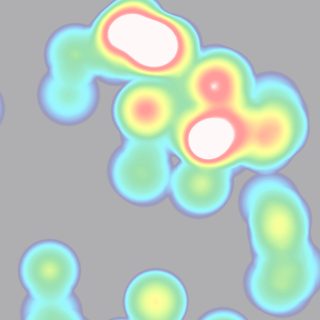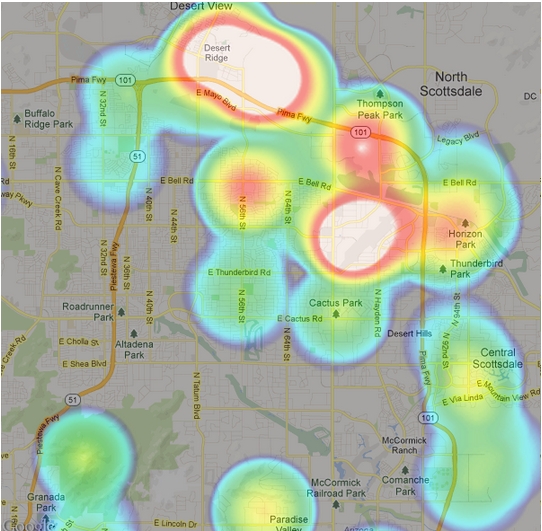The concept drives some people crazy and causes them countless hours of lost sleep, but personally I don’t mind: Google Latitude automatically broadcasts and stores a record of my whereabouts at any given time (it’s on my Android devices, iPad, iPhone and PC). In the next 10 years we’ll look at our discomfort in revealing our location the same we now look at those who were so shrill about Caller-ID 20 years ago. Sure, there are times when it might reveal too much information, but as with caller-id, I think most of us realize the benefits far outweigh the typical risks.
Below is a heat-map of my most frequented locations, updated near real-time over the past 14 months. The interesting part about Google Latitude, unlike Foursquare right now, is that I don’t have to check-in. Latitude automatically logs when I am at a location for a given number of minutes or seconds. The data on the heatmap is not all that surprising: It shows (by omission) that for the past few months I have no longer been commuting to ASU’s Walter Cronkite School of Journalism & Mass Communication in Phoenix, in favor of ASU’s Skysong incubator and other incubators in Scottsdale and Tempe. It also reflects many errands around my home in Desert Ridge.

Even more interesting and revealing are the red areas indicating frequent time spent in two unidentified areas by Highway-101: After some analysis and retrospection, I realized that Latitude logged my time spent in 2 areas where there are particularly long traffic lights at Highway entrances. This little nugget of insight tells me that I should change my typical routes, since I am spending a disproportionate amount of my life waiting for red lights.
While these are not life-changing insights, they will be. Lifecasting is already an anachronistic term – since it more specifically referred to live video-broadcasting of your daily interactions. In fact, like all great technologies, the dictionary has not yet caught up with the proper terminology: Telemetry, Bio-Telemetry, Biometrics – they are all part of a subtle emerging trend: Collecting and transmitting the most personal data about ourselves.
The very thought of this will send some of my privacy-evangelical colleagues into a psychotic tailspin, and I sympathize. At the point of trivializing the fears of these very intelligent people, their fears are ‘so last century.’ A whole generation, maybe even two generations of us have grown up with living in public – whether it is social networks, twitter or merely accustomed to credit card companies knowing our purchase habits. Sure, there are probably hundreds of awful ramifications of such private data floating about (identity theft, for one), but today’s generation is also accustomed to the unsaid benefits – and they have come to expect these benefits.
When you log on to Amazon.com or eBay (or any retail website) – many of us are disappointed, if not angry that our purchase history is not stored and used to suggest even more desirable items. One of the most viewed areas on Amazon.com is “Customers Who Bought This Item Also Bought” or “Other products you might enjoy.” How many of us have gotten a call from their credit card company saying ‘there’s been some unusual spending activity on your account and we are checking to see if you actually made those purchases’? Monitoring your personal spending behavior has its benefits.
All this is tame compared to the other benefits that await us, now that physical sensors are being built-in to low cost consumer devices (GPS being the first). Fitbit, Nike+, Jawbone’s “up” are part of a new generation of devices that monitor our physical (bio) metrics and broadcast them. Using social networking and gamification techniques, users of these devices have compelling reasons to make this information public – augmenting their health and self improvement goals.
For several years, pacemakers have had bluetooth and other communications technologies built-in so doctors can monitor and fix life threatening problems from hundreds of miles away. Soon, when we all are contributing information to the virtual stream of information, doctors will be able to have enough data to prevent illnesses or epidemics without a single casualty. This is not science fiction, and much of it is not even on the horizon – it is happening right now.
Sure, the potential for broadcasting personal information automatically has some huge positive implications for humanity – making Google Latitude’s GPS tracking seem tame. I’m sure if someone enlarges the map a little more, it might reveal that I spend way too much time at various Starbucks – but for now, I am happy that this technology saves me time from waiting at red-lights. It’s the little things.
